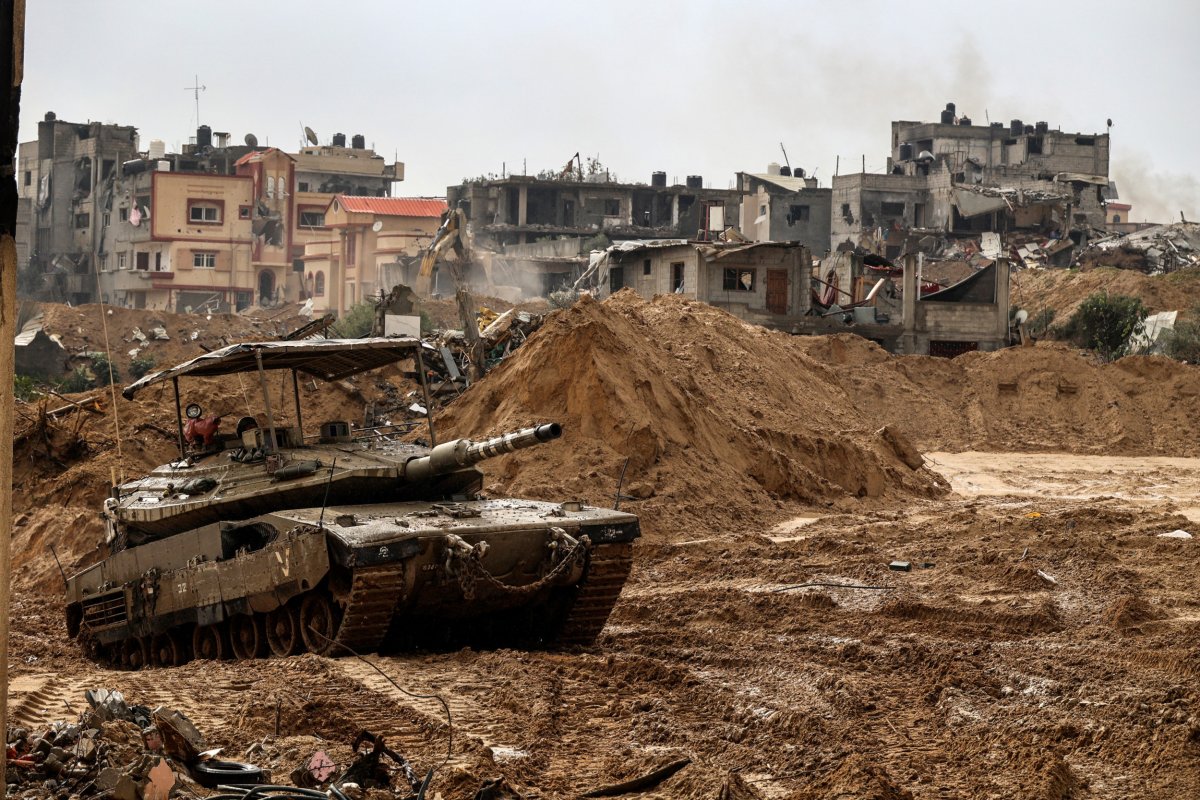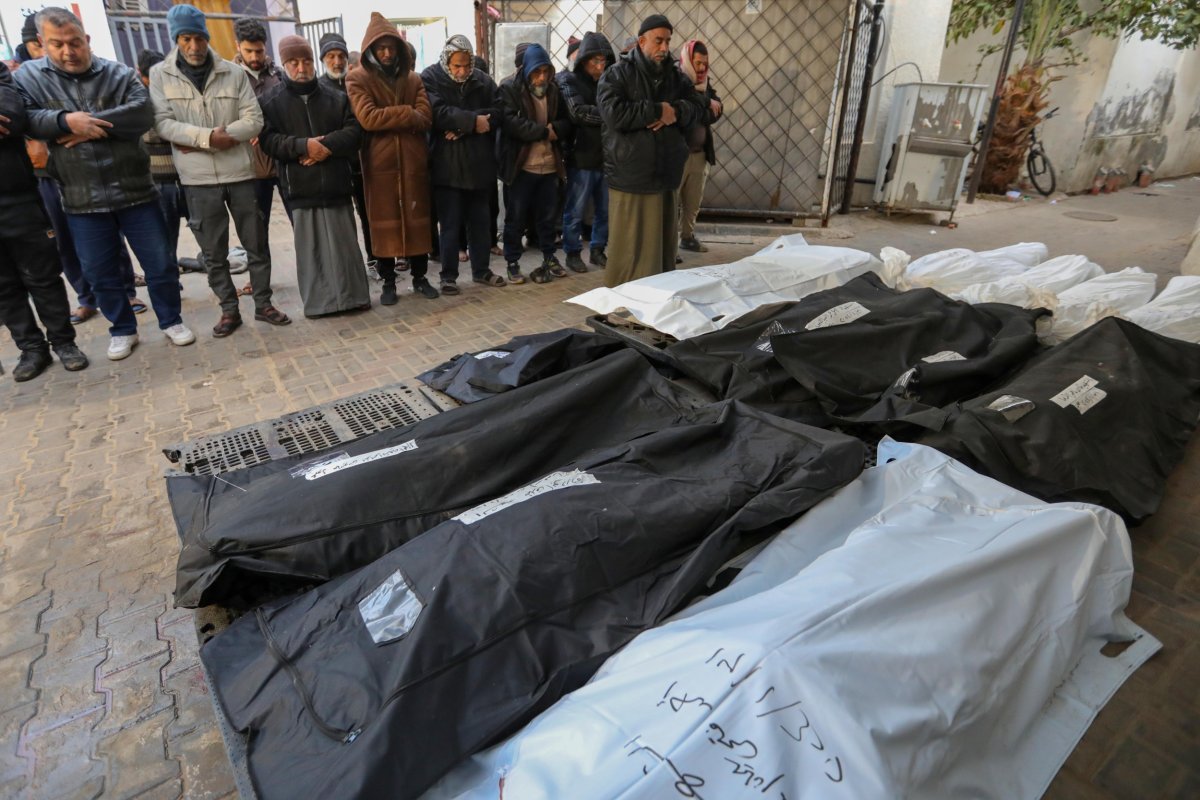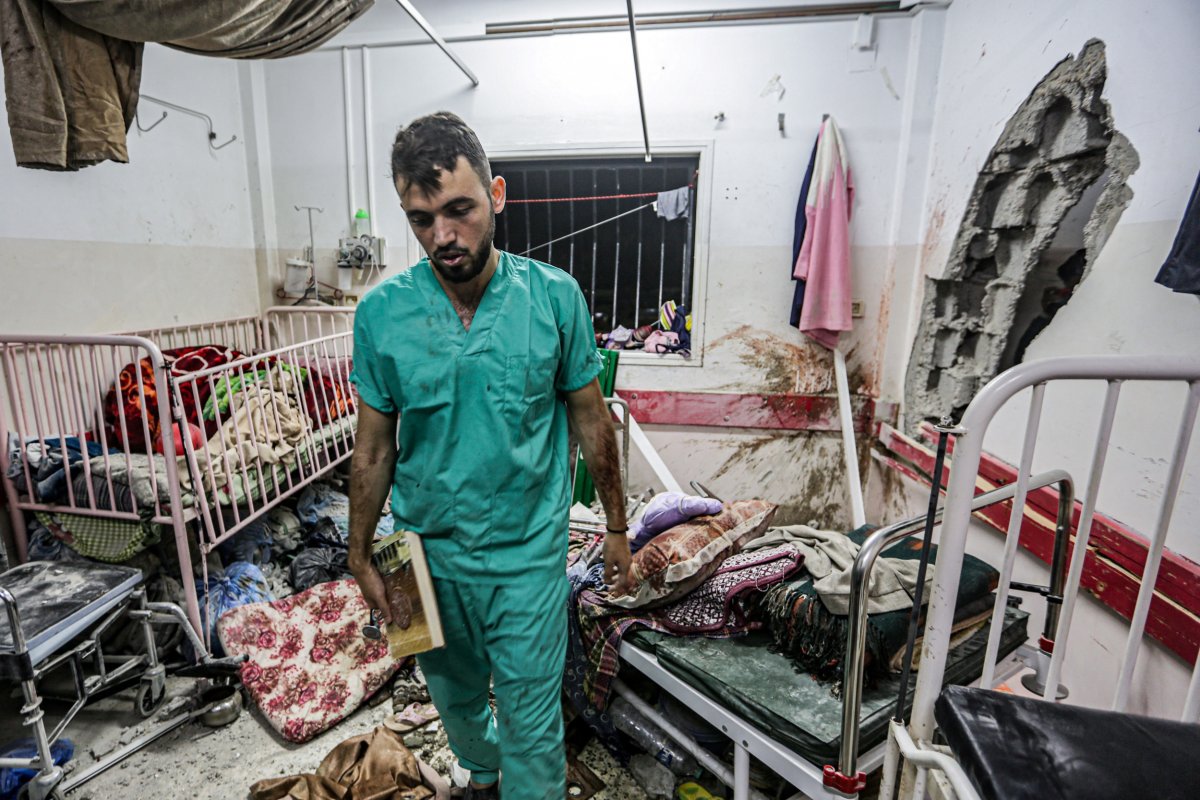More than 1.5 million people are crammed into the southern Gaza city of Rafah amid Israel's war on Hamas and other militant groups in the Palestinian coastal territory, sheltering in what has been described as the Strip's "last refuge."
Israeli airstrikes have repeatedly hit targets in Rafah, which sits along the border with Egypt. The crossing there is Gaza's only access to the outside world, and all remaining crossings along the Israeli border having been closed following Hamas' October 7 infiltration attack into southern Israel.
As the Israel Defense Forces (IDF) edge into the city of Khan Younis only a few miles north of Rafah, the war is creeping closer for those trying in vain to escape it. Gazans displaced by the fighting elsewhere have "no other place to go," American volunteer doctors recently returned from working in the Strip's struggling hospitals told Newsweek.
"People are very anxious that this will happen," Dr. Zaher Sahloul, the president and co-founder of the MedGlobal NGO who spent two weeks working in Gaza hospitals in January, said in an interview.

The IDF are still pushing to "eradicate" Hamas following the Islamist group's October 7 attack, in which some 1,200 people died and hundreds were taken back into Gaza as hostages.
Almost four months later, more than 26,700 Palestinians have been killed by Israeli forces—per figures reported by the Associated Press—among them several thousand fighters, according to IDF tallies. The Israeli military toll from the Gaza incursion now stands at 223 troops.
But Hamas is still operational, its senior leaders remain at large, and the Israeli vision for post-war Gaza appears vague.
In Rafah, the strain of the war is clear. The city's pre-war population of some 300,000 has swollen to 1.5 million as Palestinians have fled southwards. First, civilians left the northern portion of the Strip and Gaza City, in particular. Now, residents are running from the Israeli advance into Khan Younis.
"Everyone is afraid of a cholera outbreak because of the lack of clean water and the sewage infiltrating within the wells, and the pressure on the sewer system," Sahloul said, sharing his experience of working at hospitals and clinics in both Rafah and Khan Younis, until the latter became too dangerous.
Dr. John Kahler, a fellow co-founder of MedGlobal, told Newsweek that those taking shelter in Rafah "are terrified as to what's going to happen...There's only seven kilometers left before the Egyptian border." Sahloul said fighting in and around Rafah could prove "catastrophic."
Control of the Philadelphi Corridor, as the narrow strip of land running between Egypt and Gaza is known to the Israelis, certainly appears to be a major goal for Prime Minister Benjamin Netanyahu. The frontier region has long been used by Hamas and other militant groups to smuggle weapons into the Strip.
The area "must be in our hands," the prime minister said last month. "It must be shut. It is clear that any other arrangement would not ensure the demilitarization that we seek." Earlier this week, Sky News Arabia reported that Israel had informed Egypt of its intention to seize the area.
Newsweek has contacted the prime minister's office by email to request comment.

Gaza 'Collapsing'
Israeli forces have transitioned to a less intense, more targeted campaign in recent weeks. But much of Gaza has been destroyed and civilian casualties are still mounting. Israeli leaders remain committed to their maximalist goals, with the IDF preparing for a long war.
The picture is bleak for Gaza, which was already isolated and impoverished after multiple rounds of conflict with Israel and 17 years of an Israeli-Egyptian blockade of many goods, intended to choke Hamas and limit its military capabilities.
Sahloul spoke of a "collapsing of the health care system," with medical facilities, ambulances, emergency responders and doctors all falling regular victim to Israeli strikes.
"Doctors in Gaza are precious like any other place," he added. "If you kill a senior doctor, it's difficult to replace that person. Especially if they have a specialty that is rare. It's the same thing when you bomb an ambulance. Ambulances are not going to be coming back or replaced quickly."
"The same thing when you bomb a radiology department, or pharmacy department, or take the computers out of hospitals. They cannot be replaced. Why would the Israelis bomb oxygen generators, or labs, or MRI center? These things I cannot explain without saying that there is maybe intentionality to deprive the community of healthcare."
Israeli commanders and politicians have repeatedly denied intentionally targeting healthcare systems, instead accusing Hamas and other militant groups of using medical facilities and personnel as shields behind which to hide fighters and weapons.
Gaza's main hospitals have become centers of the fighting, with displaced and wounded Palestinians gravitating towards the facilities and IDF troops searching them for tunnels and militant command posts. Nasser hospital, the main facility in Khan Younis, is now largely surrounded by IDF operations.

"I stayed in Nasser for five days, in every department, moving from floor to floor, and I did not see any sign of militancy, of militants, of military activities, of suspicious activities, of weapons inside or out," Sahloul said.
The hospital remains at risk from the ongoing clashes. The IDF reported earlier this month, for example, that Hamas fighters launched a rocket from the Nasser at nearby Israeli troops.
The Strip's healthcare system is overwhelmed by the ongoing violence. Sahloul, Kahler and their colleague, Dr. Chandra Hassan, all spoke of daily "mass casualty" incidents in which dozens of people were killed and wounded by nearby Israeli strikes, among them many children.
Many "look like they're just sleeping, not a scratch on them, just covered in the concrete dust," Hassan—a trauma surgeon—recalled of dead Palestinian youngsters killed by blast waves from airstrikes.
The lack of supplies, specialists and facilities means that the prognosis for badly injured civilians is poor, Sahloul explained. "I would say 80 percent of the cases that are dying or die in Gaza, or end up with irreversible complications, could have been saved in other places," he said.
The rising number of wounded, he added, are of "astronomical proportions. The lowest estimate of the injured is about 64,000 or 65,000. Half of the injured have moderate to severe injuries."
Gaza's future remains unclear. Netanyahu is pushing back on international pressure to commit to Palestinian self-determination, while his extremist government allies back plans for new Israeli settlements in the devastated Strip.
President Joe Biden's administration is simultaneously pushing Israel to ease the killing and re-commit to a future two-state solution—under which Gaza and the occupied West Bank would form an independent Palestinian state—while providing munitions, equipment and intelligence to the IDF.
Sahloul said his desperate patients in the Strip "did not show bitterness" when dealing with the American volunteers. "People are really angry about what happened on October 7. They're not happy with it, and they're not happy with Hamas, at least the people I spoke with," he said.
"They felt that this is something that was done stupidly, and that was uncalled for. And now they are bearing the consequences."
Uncommon Knowledge
Newsweek is committed to challenging conventional wisdom and finding connections in the search for common ground.
Newsweek is committed to challenging conventional wisdom and finding connections in the search for common ground.
About the writer
David Brennan is Newsweek's Diplomatic Correspondent covering world politics and conflicts from London with a focus on NATO, the European ... Read more
To read how Newsweek uses AI as a newsroom tool, Click here.








